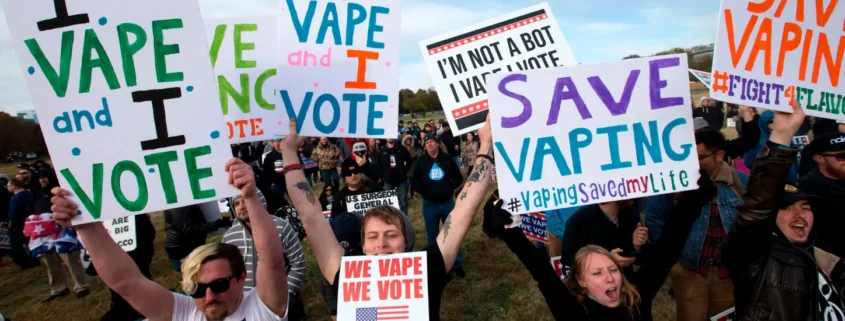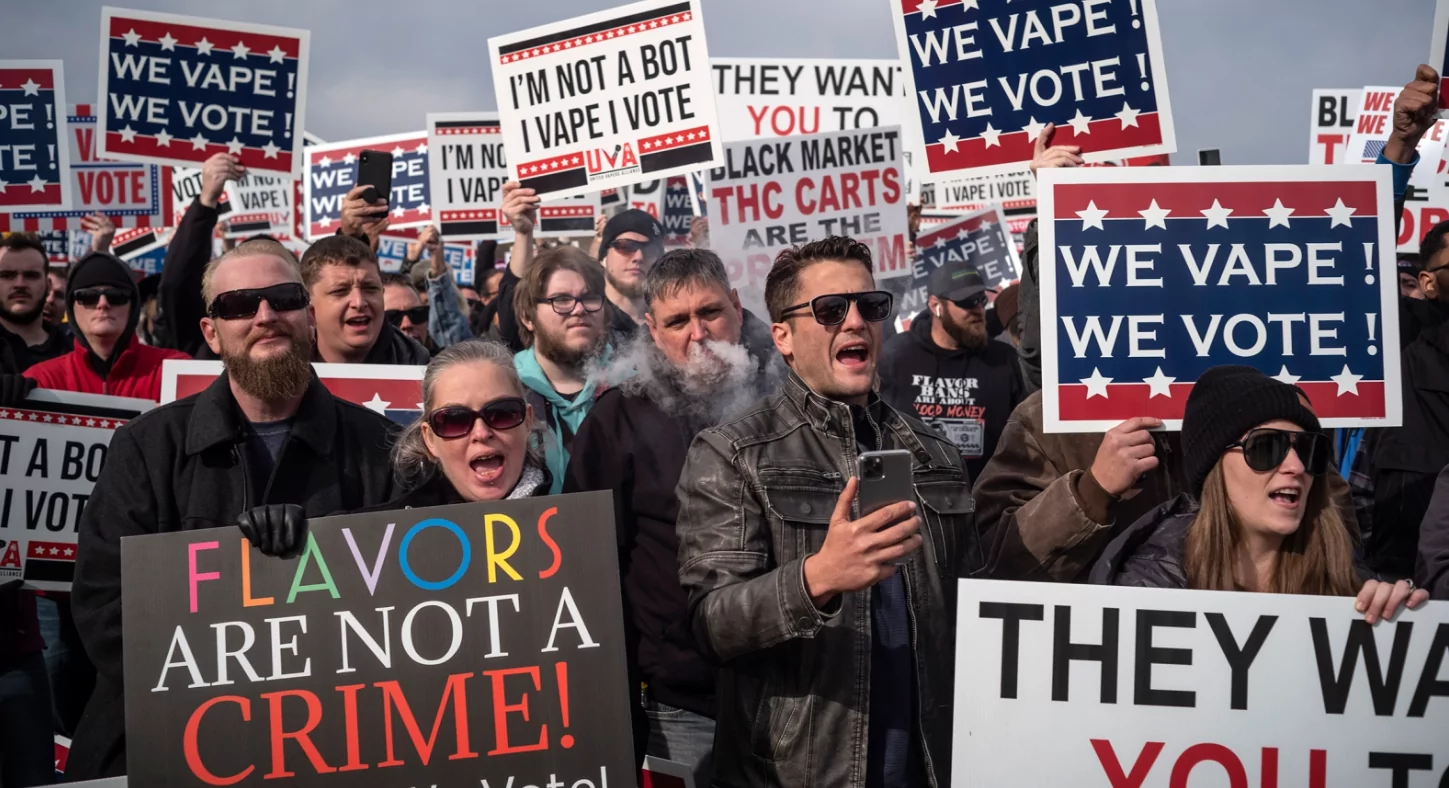Vape Bans: Exploring the Vape Regulations in U.S. and Worldwide
Vaping has come a long way in the last decade. In the early days, vaping was a fringe activity, with most people associating it with smoking traditional cigarettes. But now, it’s become a mainstream activity, with millions of people around the world actively vaping.
However, in recent years, we’ve seen a rise in the number of countries imposing vape bans. While the reasons for these bans vary, they all have the same goal: to reduce the number of people vaping and to limit the availability of e-cigarettes.
In this blog post, we’ll explore the different vape bans around the world and discuss their impact on the e-cigarette industry. We’ll also look at the pros and cons of vape bans and how the vape industry is responding to them. So, let’s dive in!
Introduction to Vape Bans
A vape ban is a law or regulation that restricts or prohibits the sale, possession, and use of e-cigarettes and other vaping products. Vape bans can range from total bans to more limited regulations, such as age restrictions and bans on certain flavors.
Vape bans are becoming increasingly common around the world. As of 2021, more than three dozen countries have implemented some form of ban or regulation on vaping products. In some cases, these bans are total, while in others they are more limited.
Overview of Vape Regulations Around the World
It’s important to note that there is no single global approach to vape regulation. Instead, countries are taking their own approach to regulating the sale, possession, and use of e-cigarettes and other vaping products.
In some countries, like the United States and United Kingdom, there are federal laws that regulate the sale, possession, and use of e-cigarettes. In other countries, like Canada and France, each province or region has its own regulations.
The most common type of vape regulation is an age restriction. In most countries, you must be 18 or over to purchase and use e-cigarettes and other vaping products. There are also restrictions on where you can use e-cigarettes, with most countries banning their use in public places like restaurants and bars.
In addition to age restrictions, many countries have also implemented bans on certain flavors of e-cigarettes. This is typically done in an effort to discourage young people from vaping, as some flavors are especially appealing to those under the legal age.
Vape Bans in USA
E-cigarettes are regulated at the state level in the United States. While some states have implemented stricter regulations, such as age restrictions and flavor bans, most states have relatively lax regulations.
At the federal level, the US Food and Drug Administration (FDA) has implemented a few regulations on e-cigarettes. For example, the FDA requires e-cigarette products to include a warning label stating that the product contains nicotine, which is an addictive substance.
In addition, the FDA has also proposed a ban on certain flavors of e-cigarettes, such as fruit and menthol. This ban has yet to be implemented, but it could have a significant impact on the e-cigarette industry if it is approved.
The following states have started putting regulations on vape sales and products:
| Arkansas | 18 | Tobacco permits issued to Arkansas businesses only allow face-to-face transactions, so online sales are prohibited |
| California | 21 | Flavor ban was attempted to be passed in 2020 but has been on hold for the November 2022 referendum. It will prohibit all vape flavors besides tobacco |
| Georgia | 21 | Georgia allows only face-to-face retail transactions of vaping products, so online sales are prohibited |
| Maine | 21 | No online sales unless between licensed businesses |
| Massachusetts | 21 | Statewide ban of all flavored vapes besides tobacco flavor |
| New Jersey | 21 | Flavor ban prohibits the sale of all flavors besides tobacco or menthol |
| New York | 21 | Flavor ban prohibits the sale of all flavors besides tobacco, menthol, mint, or wintergreen |
| Oregon | 21 | No online sales unless between licensed businesses |
| Rhode Island | 18 | Statewide ban of all flavored vapes besides tobacco flavor |
| South Dakota | 21 | Prohibits out of state shipping of all vaping products |
| Utah | 21 | No online sales unless between licensed businesses |
| Vermont | 21 | No online sales unless between licensed businesses |
Major cities with flavor bans include Chicago, IL; Los Angeles (takes effect in 2023), San Diego, Sacramento, Oakland and San Jose, CA; and Boulder, CO. Hundreds of smaller cities and counties—mostly in California—have flavor bans, as do some larger cities whose bans have since been superseded by state bans (like New York City and Newark, NJ)
Complete bans on vaping product sales have been adopted by San Francisco and some smaller California cities
Wikipedia: List of Vaping Bans in the United States
Vape Bans in Other Countries
Vape bans are becoming increasingly common around the world. As of 2021, more than three dozen countries have implemented some form of ban or regulation on vaping products. Some countries have outright bans on use and sales, others just ban sales, and some ban only nicotine-containing products. In many countries, the laws are ignored and black markets flourish.
Suche as Canada, Australia, France, each province has its own regulations on e-cigarettes. While some provinces have implemented stricter regulations, such as age restrictions and flavor bans, most provinces have relatively lax regulations.
Let’s check the different vaping regulation in other countries:
Antigua and Barbuda
Legal to use, illegal to sell
Argentina
Legal to use, illegal to sell
Australia
Legal to use, illegal to possess nicotine without a doctor’s prescription. Importing nicotine illegally can be punished with fines of up to $222,000. Penalties for possession vary from one state to the next, but can also be quite severe
Bangladesh
Bangladesh currently has no laws or regulations specific to vaping. However, in 2021 the government announced it would update the country’s tobacco control law with an outright ban on the sales of e-cigarettes
Bhutan
Legal to use, illegal to sell
Brazil
Legal to use, illegal to sell
Brunei Darussalam
Legal to use, illegal to sell
Cambodia
Banned: illegal to use, illegal to sell
Chile
Legal to use, illegal to sell (except approved medical products)
Colombia
Legal to use, illegal to sell
East Timor
Believed to be banned
Egypt
Legal to use, illegal to sell—although the country may be on the verge of regulating vaping products
Ethiopia
Believed legal to use, illegal to sell
Gambia
Believed illegal to use, illegal to sell
Hong Kong
Legal to use, illegal to sell since 2022
India
Legal to use, illegal to sell. In September 2019, the Indian central government banned sales of vaping products. The government, well aware that 100 million Indians smoke and that tobacco kills nearly a million people a year, did not make any moves to reduce access to cigarettes. Not coincidentally, the Indian government owns a large share of the country’s largest tobacco company
Iran
Believed legal to use, illegal to sell
Jamaica
Legal to use, illegal to sell nicotine-containing products without a medical license
Japan
Legal to use, legal to sell devices and zero-nicotine e-liquid, but illegal to sell nicotine-containing liquid (although individuals can import nicotine-containing products with some restrictions). Heated tobacco products (HTPs) like IQOS are legal and extremely popular
Kuwait
Believed legal to use, illegal to sell
Lao People’s Democratic Republic (Laos)
Illegal to use, illegal to sell
Lebanon
Legal to use, illegal to sell
Macau
Possibly legal to use, illegal to sell. On Dec. 5, 2022 a law banning the manufacture, distribution, sale, import, export, and transport in and out of Macau of all vaping products will take effect. While personal use may be technically legal, there seems to be no way to acquire products without violating the import or transport bans
Malaysia
Legal to use, illegal to sell nicotine-containing products. Although consumer sales of nicotine-containing products is illegal, Malaysia has a thriving vaping market. Authorities occasionally raid retailers and confiscate products. Sales of all vaping products (even without nicotine) are banned outright in the states of Johor, Kedah, Kelantan, Penang and Terengganu
Mauritius
Legal to use, illegal to sell
Mexico
Legal to use, illegal to sell. The Mexican president issued a decree banning sales of all vapes and heated tobacco products in May 2022. The law includes nicotine-free products
Myanmar
Believed to be banned
Nepal
Legal to use, possibly illegal to sell (although the government itself seems unsure)
Nicaragua
Believed illegal to use, illegal to sell
North Korea (Democratic People’s Republic of Korea)
Banned
Oman
Believed legal to use, illegal to sell
Panama
Legal to use, illegal to sell
Qatar
Banned: illegal to use, illegal to sell
Seychelles
Legal to use, illegal to sell. However, the country announced in 2019 its intention to legalize and regulate e-cigarettes
Singapore
Banned: illegal to use, illegal to sell. As of 2018, possession of vapes is a crime, punishable by fines and even prison time. However, the threat of prosecution doesn’t prevent a thriving black market
Sri Lanka
Legal to use, illegal to sell
Suriname
Legal to use, illegal to sell
Syria
Banned: illegal to use, illegal to sell
Thailand
Believed legal to use, illegal to sell. Thailand has earned a reputation for enforcing its ban on importation and sales of vaping products with several high-profile incidents in recent years, including detaining and even deporting tourists caught vaping
Timor-Leste
Legal to use, illegal to sell
Turkey
Legal to use, illegal to import. Importation of vaping products is illegal in Turkey, and when the country reaffirmed its ban in 2017, the World Health Organization issued a press release cheering the decision. But Turkey’s laws are conflicting, and there is a vaping market and a vaping community in Turkey
Turkmenistan
Believed legal to use, illegal to sell
Uganda
Legal to use, illegal to sell
United States
Legal to use, legal to sell—but sales of products not authorized by the FDA became technically illegal as of Sept. 9, 2021. Although no state has banned sales of vaping products outright, many have bans on flavored products or online sales. Some California cities, notably San Francisco, have banned sales of all e-cigarettes
Uruguay
Legal to use, illegal to sell
Vatican City
Believed to be banned
Venezuela
Legal to use, believed illegal to sell, unless approved as medical products
Source: (Check the full list of vaping laws in different countires)
- Tobacco Control Laws (Campaign for Tobacco-Free Kids)
- Institute for Global Tobacco Control (Johns Hopkins University)
Countries with the Most Restrictive Vape Bans
Some countries have implemented more restrictive vape bans than others. Let’s take a look at some of the countries with the most restrictive vape bans in the world.
The Singapore, Malaysia, Thailand and United Arab Emirates (UAE) which has implemented a total ban on the sale, possession, and use of e-cigarettes. In Singapore, it is illegal to buy, sell, or use any form of e-cigarette or vaping product. This ban is strictly enforced and those caught breaking the law can face fines and even jail time.
Countries with the Least Restrictive Vape Bans
On the other end of the spectrum, there are countries with the least restrictive vape bans in the world. Let’s take a look at some of these countries and how they approach e-cigarette regulations.
United Kingdom, where each region has its own regulations. In most cases, these regulations are fairly lax, with only a few regions implementing more restrictive regulations such as age restrictions and flavor bans.
Canada is another country with relatively lax regulations on e-cigarettes. While some provinces have implemented stricter regulations, such as age restrictions and flavor bans, most provinces have relatively lax regulations.
Impact of Vape Bans on the E-cigarette Industry
Vape bans can have a significant impact on the e-cigarette industry. By making it more difficult to access e-cigarettes and other vaping products, vape bans can reduce sales and put a strain on the industry. This can have a knock-on effect on the economy, as the e-cigarette industry is a significant employer in many countries.
In addition, vape bans can also reduce innovation in the industry. By making it more difficult to access e-cigarettes and other vaping products, vape bans can reduce the incentive for companies to invest in research and development. This can lead to a stagnation in the industry, as companies are less likely to invest in new and innovative products.
How the Vape Industry is Responding to Vape Bans
The vape industry is responding to vape bans in a variety of ways. Some companies are trying to find ways to comply with the bans, such as introducing age-verification systems to ensure that only those over the legal age can purchase e-cigarettes.
Some other companies are looking for ways to circumvent the bans, such as developing products that are not covered by the ban. This can be a risky strategy, as it can lead to companies running afoul of the law.
There are also some companies are taking a more aggressive approach, challenging the legality of the bans in court and lobbying governments to get them overturned. While this can be a long and expensive process, it can be an effective way of getting the bans overturned.
The Future of Vape Bans
It’s hard to say what the future of vape bans will look like. In some countries, like the United States, the federal government has taken a more hands-off approach, leaving it up to the states to implement their own regulations. In other countries, like the United Kingdom, the federal government has taken a more active role, proposing and implementing regulations at the national level.
It’s likely that we will see more countries implementing vape bans in the future. However, it’s also likely that we will see more countries taking a more nuanced approach to regulation, focusing on specific aspects of the e-cigarette industry, such as flavors and advertising.
Conclusion
Vape bans are becoming increasingly common around the world. While the reasons for these bans vary, they all have the same goal: to reduce the number of people vaping and to limit the availability of e-cigarettes.
In this blog post, we explored the different vape bans around the world and discussed their impact on the e-cigarette industry. We also looked at the pros and cons of vape bans and how the vape industry is responding to them.
At the end of the day, it’s hard to say what the future of vape bans will look like. It’s likely that we will see more countries implementing vape bans, but it’s also likely that we will see more countries taking a more nuanced approach to regulation.
If you’re looking to stay up to date on the latest vape bans and regulations, be sure to check out our blog for more information. We’ll be sure to keep you informed on all the latest developments in the e-cigarette industry!
- Is Vaping While Driving Illegal in New Mexico? - June 28, 2025
- Vaping Laws in New Mexico: Guide of Age, Flavors, Tax & Rules - June 28, 2025
- Vaping Laws in New Hampshire: A Comprehensive Guide for You - June 27, 2025










